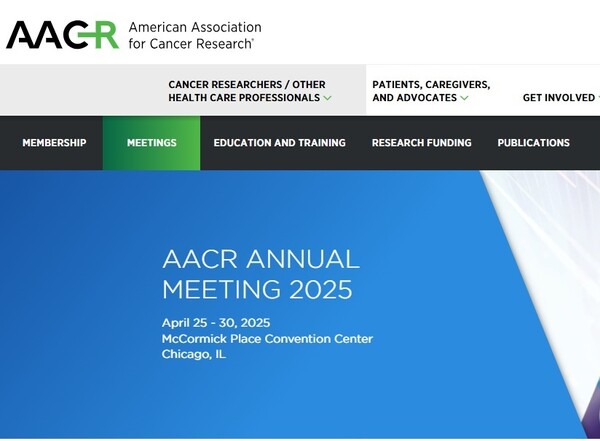A large number of Korean pharmaceutical and biotech companies are set to present their latest oncology research at the American Association for Cancer Research (AACR) Annual Meeting 2025, which will be held from April 25 to 30 in Chicago, Illinois.

Korean pharma and biotech firms will present cutting-edge oncology pipelines, including novel immunotherapies, AI diagnostics, and first-in-class drug candidates, at the AACR 2025 annual meeting in Chicago. (Screen captured from AACR website)
As one of the world’s largest academic gathering in the field of cancer research, AACR brings together scientists, clinicians, and industry leaders to unveil cutting-edge advancements and discuss the future of cancer treatment.
For Korean drugmakers, AACR has become a crucial stage to present early-phase clinical data and engage with global partners for potential licensing and collaboration. This year, a wide range of companies, including Daewoong Pharmaceutical, Onconic Therapeutics, STCube, Abion, LegoChem Biosciences, Lunit, Sillajen, Idience, Aptabio, and Deep Bio, will showcase their pipelines spanning immunotherapies, synthetic lethality agents, antibody drug conjugates (ADCs), and AI-powered diagnostic technologies.
Daewoong Pharmaceutical will present three innovative anti-cancer drug candidates—DWP216, DWP217, and DWP223—each targeting a unique mechanism of action with first-in-class potential.
DWP216 selectively inhibits TEAD1 to target NF2-mutant tumors, a setting with no existing targeted therapies. DWP217 inhibits arginase to help overcome immune suppression in the tumor microenvironment and could potentially be used in combination with PD-1 checkpoint inhibitors. DWP223 is a synthetic lethality agent designed for BRCA1/2-mutated cancers, especially those resistant to current PARP inhibitors. Preclinical studies have shown powerful anti-tumor effects with minimal toxicity, and the company plans to submit an IND application within the year.
Onconic Therapeutics will unveil data on nesuparib, a dual PARP and Tankyrase (TNKS) inhibitor being developed for gastric cancer. Unlike traditional PARP inhibitors, nesuparib has shown efficacy in both homologous recombination-deficient and -proficient cancer models.
The drug demonstrated significantly stronger anti-tumor effects compared to olaparib and XAV939 in preclinical trials. With U.S. FDA Orphan Drug Designation secured, Onconic is advancing toward expanded clinical development.
STCube will highlight research into BTN1A1, a novel biomarker for colorectal cancer, and its associated dual-targeted immunotherapy approach involving YAP1. The company’s study explores BTN1A1’s role as an immune checkpoint protein and its expression in both immune and tumor cells, introducing a potential strategy for overcoming immunotherapy resistance in colorectal cancer.
Lunit, in collaboration with AstraZeneca, will present research on an AI-based approach to predict EGFR mutations in non-small cell lung cancer using histopathology images. This study supports the growing role of AI in improving precision diagnostics in oncology.
SillaJen will present early safety data from a first-in-human Phase 1/2a trial of PBP1510, an anti-PAUF antibody therapy for pancreatic cancer. The study is being conducted in the U.S. under the leadership of Northwell Health’s Dr. Daniel A. King. With around 70 percent of the patients enrolled, the company expects the trial to finish enrollment soon and is preparing to advance toward larger clinical studies.
Deep Bio will present three studies featuring its AI-powered biomarker quantification and diagnostic technologies. These include automated image analysis of PD-L1 and c-MET in immunohistochemistry, and a deep learning-based system for diagnosing metastatic breast cancer in lymph node pathology slides.
Abion plans to present results from its c-MET inhibitor Vabametkib (ABN401), developed for non-small cell lung cancer, in combination with Yuhan’s Lazertinib. Additional data will be shared on ABN501, a Claudin 3-targeting antibody, and ABN202, a novel antibody-cytokine conjugate platform. The company is also in active licensing negotiations with partners in the U.S., Europe, and Russia.
LegoChem Biosciences will present five studies, including the STING agonist LCB39, a candidate that addresses previous efficacy and safety limitations in the class. LCB39 enhances tumor penetration and exposure while minimizing systemic toxicity. The company will also share preclinical data on ADCs such as SOT106 and IKS04, developed through platform technology out-licensing to global partners.
Idience, the drug development arm of Ildong Pharmaceutical Group, will present four anticancer candidates, including ID12023, a cancer stem cell-targeting therapy that normalizes microRNA expression. Additional candidates include ID12241 for KRAS-mutant cancers, ID11916 for treatment-resistant prostate cancer, and ID12401, an ADC loaded with a PARP1 inhibitor.
Aptabio will highlight its research on APX-343A, a next-generation immunotherapy targeting cancer-associated fibroblasts (CAFs) that are unresponsive to checkpoint inhibitors. The company will also present preclinical data on Apta-16, an aptamer-drug conjugate that targets nucleolin in hematologic cancers such as acute myeloid leukemia. Both candidates leverage the tumor microenvironment as a therapeutic axis.